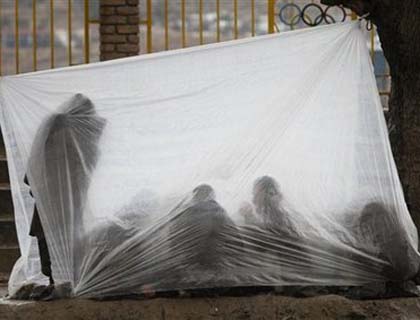With no exception, all failed states, weak states as well as those ones which just emerge out of armed conflict are in due need of reconstruction and developmental program. Needless to say, these kinds of States do not have enough resources to hold reconstructive projects and provide public services to common people. They indiscriminately depend on financial as well as technical support of international community to help them stand on their own feet. But what is far more important than the actual assistance is taking good policies to steer donations where they are needed most. What is the case in Afghanistan?
Here we largely suffer from a vice triangle—narcotics, insurgency and poor governance or let’s say corruption. These challenges virtually have worked as deriving force of one another. International community during past eleven years largely poured cash and steered visible human resource too into the country. But in comparison to that quantity, we terribly limp on almost in all stages and spheres.
The security situation is not encouraging. Politics circulates around communal and lingual peg. We have a quite vibrant democracy but only on the communal lines, as the controversy in parliament clearly showcased last year. They finally reached into compromise——MPs from three big communities of Afghanistan, Pashtun, Tajik and Hazara would not nominate themselves for the slot of house speaker and an MP from a minority community should be nominated, as it occurred, and ultimately, Mr. Ibrahimi, a MP from Uzbek community became the speaker of the house.
The condition of administration of President Hameed Karzia is similar. It has no idea about how to face with spiraling corruption within the administration, which has left it poor and inefficient.
But the challenge that narcotics deal to the country is parallel to above fellows and necessitates serious attention to be eliminated.
It does not cause less misery than Taliban-insurgency if it goes on current path. According a report more than 1.5 million Afghans are addicted to opium or to products made of it, like hashish, heroin. The report also predicted that it might increase in upcoming years. It is hard to understand that what addiction means if you have not seen those who are addicted. Many of them are left out in the public and certainly numbers of them will die in the upcoming harsh freezing weather—falling to 20 Celsius below zero.
Along with the human tragedy that hundreds die due to addiction annually, it also increases social crimes. In Herat Province, you cannot dare to wear new shoes and leave them outside of the hotel rooms. Guests just take a plastic cover and carries their shoes with themselves while coming to hotel for taking lunch, dining or intend to stay at night, Because there are huge numbers of addicted refugees who are deported from Iran.
Whatever is the result, huge numbers of Afghan refugees in Iran are addicted to drugs, particularly, those youngsters who left the country without their family members.
When the Iranian security forces deport them back to Afghanistan, many of them have no place to go, because with carrying the sickness of addiction, they do not dare to go to homes, and stay with their family members or, perhaps, some feel shy to do so.
In addition, the problem becomes double as the conservative culture of Afghanistan promotes. If an employer becomes aware that the employee is addicted to drugs, he may fire them. The society cannot accept them too. An addicted individual finds so hard to get married. The first problem is that parents of a girl wouldn’t agree at any cost to marry their daughter to an addicted individual because they do not have good attitude towards him. They might think that he cannot bear the responsibility of marriage life or is not able to provide the necessity of their daughters.
I agree with them. They are right. In Afghanistan the problem of addiction differs with those in developed or perhaps in developing countries. Many people in the world consume drugs as kind of luxurious goods, and they have money and wealth to buy it and, meanwhile, essential goods are guaranteed. The case is quite different here.
Addiction has mostly targeted lower layer of the society, who are involved in cultivating and growing opium. Or those who became refugees to neighboring countries and could bear the back-breaking problem of refugee life. So, in order to avoid those challenges, they found no way other than reprimanding nerves in order not to feel the psychological pain. After addiction, there is no money to provide them drugs; however, it is cheap in the country.
Therefore, they start becoming parasite. The very social door is closed towards them, because they are not married. In a country like Afghanistan, finding a house or room for single is very difficult. Here being a single is a crime. If you walk to streets of Kabul or contact brokers, the first question is, “Are you married or not?” If not, then they say, “Sorry, we do not have room for rent”. Here marriage is a door of accepting people.
Additionally, poverty prevails in the country, and annually people die due to hunger. Majority of those who use drugs are illiterate.
They cannot search for office job, which has comparatively convenient sphere for such people. Thus, they remain parasite. When all doors are closed, what they can do? They steal! They change into pickpockets. It means threatening the safety of people’s property.
If the number was less, I was not worried. Recently I wrote several articles about the narcotics-caused challenges. The number of addicts is staggering. They are also reports that Afghan security forces too use drugs. This phenomenon gives birth to another vicious cycle. They will cooperate with opium-lords and gangsters. The process may end up into poor governance, inefficiency of administration and spiraling growth of corruption—and ultimately the progression of instability and deterioration of security situation.

